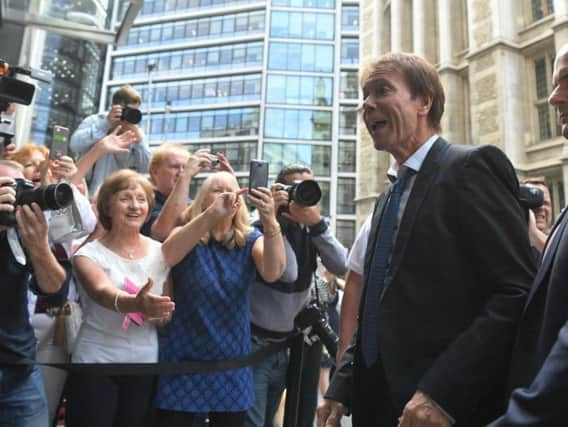Sir Cliff Richard wins privacy case against BBC


Sir Cliff had sued the corporation after it broadcast a search by South Yorkshire Police at his home in Sunningdale, Berkshire, in August 2014, following a child sex assault allegation.
Announcing his High Court ruling, Mr Justice Mann said the BBC had infringed the star’s privacy rights in a “serious and sensationalist way”.
Advertisement
Hide AdAdvertisement
Hide AdHe awarded Sir Cliff £190,000 damages for the “general effect” on his life as well as an additional £20,000 because the BBC had aggravated the damage by nominating the story for an award.
He said the star is entitled to recover further sums for financial losses, which will be decided at a later date.
South Yorkshire Police had already apologised to the star and agreed to pay £400,000 in damages, plus costs.
The singer said it was “going to take a little while” as he was too emotional to talk, and added: “I hope you’ll forgive me.”
Advertisement
Hide AdAdvertisement
Hide AdLawyer Gideon Benaim said the singer never expected, after 60 years in the public eye, to have his “privacy and reputation tarnished in such a way”. He said the BBC refused to apologise and insisted it had run a public interest story.
The 77-year-old singer hugged friends after the ruling and as he left court fans clapped and sang his hit song Congratulations.
“I’m choked up,” he said. “I can’t believe it. It’s wonderful news.”
BBC Director of News Fran Unsworth said they were considering appealing against the ruling. The corporation said the judgement was a blow to press freedoms and could lead to police investigations going unreported.
Advertisement
Hide AdAdvertisement
Hide Ad“This impacts not just the BBC, but every media organisation. This isn’t just about reporting on individuals. It means police investigations, and searches of people’s homes, could go unreported and unscrutinised.
“It will make it harder to scrutinise the conduct of the police and we fear it will undermine the wider principle of the public’s right to know. It will put decision-making in the hands of the police.
“We don’t believe this is compatible with liberty and press freedoms, something that has been at the heart of this country for generations. For all of these reasons, there is a significant principle at stake. That is why the BBC is looking at an appeal.”
Mr Justice Mann oversaw a trial at the High Court in London during April and May.
Advertisement
Hide AdAdvertisement
Hide AdSir Cliff told the judge that coverage, which involved the use of a helicopter, was a “very serious invasion” of his privacy.
The BBC disputed his claims, saying the coverage was accurate and that the broadcaster reported Sir Cliff’s “full denial of the allegations at every stage”.
A key part of Mr Justice Mann’s findings centred around whether South Yorkshire Police voluntarily gave the BBC the details of the raid, which was the BBC’s case, or acted out of “a fear and implicit threat that the BBC would or might publish news of the investigation before the police were ready to conduct their search”, which was the force’s case.
He said he had accepted South Yorkshire Police’s version of events. He ruled that the force was liable for 35 per cent of the £190,000 damages and the BBC was liable for 65 per cent.
